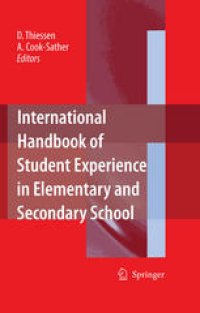
Ebook: International Handbook of Student Experience in Elementary and Secondary School
- Tags: Teacher Education, Learning & Instruction, Curriculum Studies, Educational Policy, Childhood Education
- Year: 2007
- Publisher: Springer Netherlands
- Edition: 1
- Language: English
- pdf
The International Handbook of Student Experience in Elementary and Secondary School is the first handbook of its kind to be published. It brings together in a single volume the groundbreaking work of scholars who have conducted studies of student experiences of school in Afghanistan, Australia, Canada, England, Ghana, Ireland, Pakistan, and the United States. Drawing extensively on students’ interpretations of their experiences in school as expressed in their own words, chapter authors offer insights into how students conceptualize and approach school, how students understand and address the ongoing social opportunities for and challenges in working with other students and teachers, and the multiple ways in which students shape and contribute to school improvement. The individual chapters are framed by an opening chapter, which provides background on, bases of, and trends in research on students’ experiences of school, and a final chapter, which uses the interpretive framework translation provided to explore how researching students’ experiences of school challenges those involved to translate the qualitative research methods they use, the terms they evoke to describe and define students’ experiences of schools, and, in fact, themselves as researchers.
The International Handbook of Student Experience in Elementary and Secondary School is the first handbook of its kind to be published. It brings together in a single volume the groundbreaking work of scholars who have conducted studies of student experiences of school in Afghanistan, Australia, Canada, England, Ghana, Ireland, Pakistan, and the United States. Drawing extensively on students’ interpretations of their experiences in school as expressed in their own words, chapter authors offer insights into how students conceptualize and approach school, how students understand and address the ongoing social opportunities for and challenges in working with other students and teachers, and the multiple ways in which students shape and contribute to school improvement. The individual chapters are framed by an opening chapter, which provides background on, bases of, and trends in research on students’ experiences of school, and a final chapter, which uses the interpretive framework translation provided to explore how researching students’ experiences of school challenges those involved to translate the qualitative research methods they use, the terms they evoke to describe and define students’ experiences of schools, and, in fact, themselves as researchers.